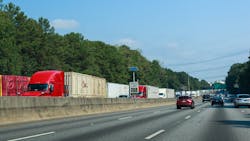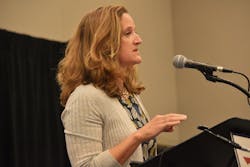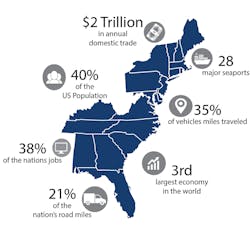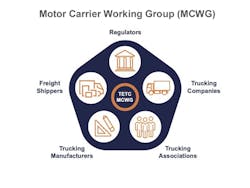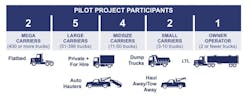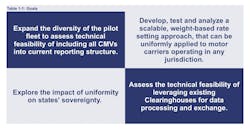Pick your poison, truckers: Flat VMT fee, efficiency-based, or weight-based?
If there was a theme to the discussion around highway funding and how to get EVs to pay their fair share, the American Trucking Associations' Highway Policy Committee heard the obvious: Trucks are not passenger vehicles—and policy must reflect and respect the differences. But the committee, meeting during the recent ATA Management Conference & Exhibition, also heard that's easier said than done.
A mileage-based user fee (MBUF), for better or worse, is among the gas-tax alternatives being debated in various state legislatures, as Patricia Hendren, executive director of Eastern Transportation Coalition, explained to a packed conference room.
The organization understands the "complexity" of the trucking industry, and so fleets' viewpoints must be part of any national discussion around road user fees. And the time for trucking to be heard is now.
As Hendren illustrated in her presentation, the increase in the number of states exploring mileage-based user fees or weight-distance taxes—and, in a few instances, enacting them—between 2016 and 2023 is "pretty remarkable."
"State legislatures are paying attention," she said. "That's where we need to get worried—if legislation is passed without information, or passed with bad programs, all create more administrative burdens."
See also: Cutting taxes could cut emissions faster than imposing EVs on fleets
When states lump trucks in with passenger car legislation
"The fact we have two new pieces of legislation is a wake-up call that a weight-based tax is coming back," Hendren said. "The point is this is coming to the motor carrier industry, so how do you get prepared to push back?"
"Nothing drives me more crazy than legislation that is designed for passenger vehicles, and it will say 'and trucks' at the end," she said. "And that's what we're concerned was going to happen."
The Eastern Transportation Coalition is a partnership of 18 states and D.C. focused on connecting public agencies across modes of travel to increase safety and efficiency. Formerly the I-95 Corridor Coalition, Hendren characterized ETC as a "boots-on-the-ground, operations-oriented entity" that tackles problems bigger than a single state can handle. She mentioned "getting information into truck cabs" and truck parking among the freight-related issues the organization deals with.
As for MBUFs, the coalition maintains a "neutral" position, "but if we are going to go in this direction, let's do it the right way," she noted.
To that end, ETC secured federal grants to launch motor carrier pilot programs and formed a Motor Carrier Working Group to ensure "the interests of trucking are being considered" when policymakers discuss a potential mileage-based user fee system.
"We get together and close the door and say, 'OK, what are we going to do if a state passes a distance-based fee? How do we prepare?" Hendren said. "How do we ask for something that's different? How do we push back on things we don't want? And how do we design our work to try to get our questions answered?"
"It's pretty easy to show just the impact of this industry and that it's different—it's not rocket science stuff," she said. "Trucks are not big cars. We have existing regulations that we can piggyback for a national system if we need to go in this direction. We have technology in our vehicles; how can we leverage that? How do we take the lessons learned from IFTA and IRP? How do we be thoughtful about this going forward?
"We're just highlighting some of those things that are probably obvious to everyone in this room but are not obvious to a lot of people who don't understand your industry."
See also: Unelected ‘extremists’ threaten U.S. economy, warns ATA leader
Weight-based fees on the regulation horizon
Among the insights from the pilot, setting fee rates is "definitely a very sensitive topic." A single rate, studied in 2018-2019, "created winners and losers" because all trucks aren't the same and how they're used is not the same, Hendren explained. Similarly, setting mileage rates based on fuel efficiency (2020-2021 study) was also problematic, such as a carrier's efficiency rating falling just outside of a more favorable rate. The 2022 pilot next looked at fees based on weight.
"We know that weight is a four-letter word in your industry, but that is probably where this is going to go," she said. "And then, again, states are going to do their own thing. But what we always hear from the motor carrier industry is: 'We want uniformity.' So, don't have different rules in every single state—it's just not how you can do your business. So how do we create uniformity?"
The coalition's four significant findings from the report, published last month, are:
- MBUF can be applied to all commercial vehicles regardless of weight, fuel type, international travel, and type of operation.
- A weight-based MBUF has the potential to provide a more transparent link between usage and cost of road use.
- Uniformity does not have to be identical to be scalable and has the potential to substantially decrease administrative costs on the motor carrier and agency sides.
- Clearinghouse frameworks can be adapted to handle MBUF, but roles and responsibilities must be clearly defined.
In concluding her presentation, Hendren again emphasized the coalition's goal of ensuring the trucking industry's complexity is fully considered in user-fee policy decisions and showing "what could or couldn't work, what might work."
"A challenge is going to be when people take our report and go, 'this group says we can do a VMT fee'—that is not what the report says," she insisted. "We keep using the term that this is 'capable, not ready.' The point is, there's more work to be done."
She noted that the next pilot will focus on EVs and the feasibility of a kilowatt/hour approach to user fees.
Next week: As one might imagine, folks in the room had some strong opinions on once-and-future weight-miles user fees for trucking.
About the Author
Kevin Jones
Editor
Kevin has served as editor-in-chief of Trailer/Body Builders magazine since 2017—just the third editor in the magazine’s 60 years. He is also editorial director for Endeavor Business Media’s Commercial Vehicle group, which includes FleetOwner, Bulk Transporter, Refrigerated Transporter, American Trucker, and Fleet Maintenance magazines and websites.
Working from Beaufort, S.C., Kevin has covered trucking and manufacturing for nearly 20 years. His writing and commentary about the trucking industry and, previously, business and government, has been recognized with numerous state, regional, and national journalism awards.
